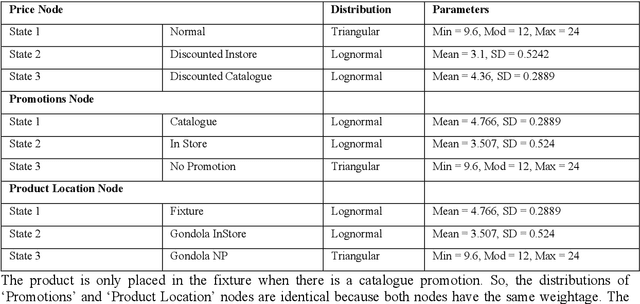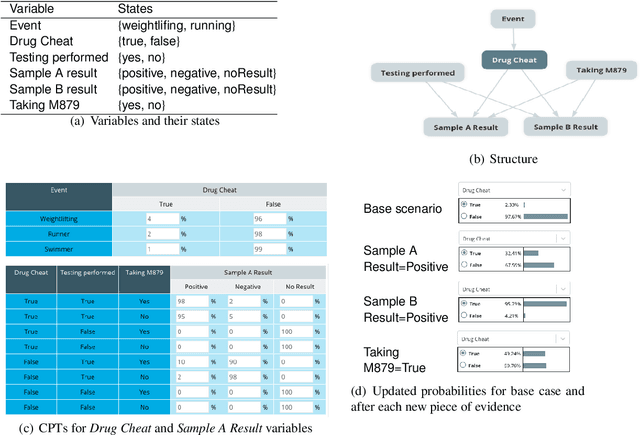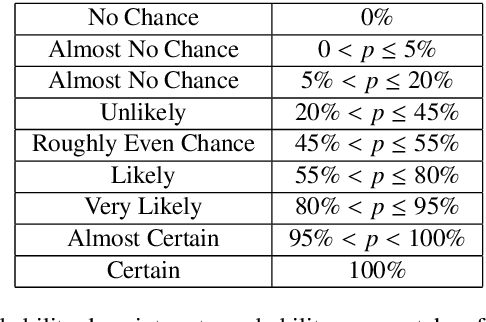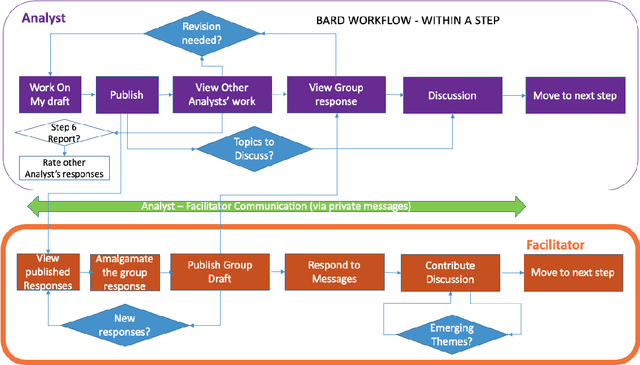Abraham Oshni Alvandi
Forecasting sales with Bayesian networks: a case study of a supermarket product in the presence of promotions
Dec 16, 2021



Abstract:Sales forecasting is the prerequisite for a lot of managerial decisions such as production planning, material resource planning and budgeting in the supply chain. Promotions are one of the most important business strategies that are often used to boost sales. While promotions are attractive for generating demand, it is often difficult to forecast demand in their presence. In the past few decades, several quantitative models have been developed to forecast sales including statistical and machine learning models. However, these methods may not be adequate to account for all the internal and external factors that may impact sales. As a result, qualitative models have been adopted along with quantitative methods as consulting experts has been proven to improve forecast accuracy by providing contextual information. Such models are being used extensively to account for factors that can lead to a rapid change in sales, such as during promotions. In this paper, we aim to use Bayesian Networks to forecast promotional sales where a combination of factors such as price, type of promotions, and product location impacts sales. We choose to develop a BN model because BN models essentially have the capability to combine various qualitative and quantitative factors with causal forms, making it an attractive tool for sales forecasting during promotions. This can be used to adjust a company's promotional strategy in the context of this case study. We gather sales data for a particular product from a retailer that sells products in Australia. We develop a Bayesian Network for this product and validate our results by empirical analysis. This paper confirms that BNs can be effectively used to forecast sales, especially during promotions. In the end, we provide some research avenues for using BNs in forecasting sales.
BARD: A structured technique for group elicitation of Bayesian networks to support analytic reasoning
Mar 02, 2020



Abstract:In many complex, real-world situations, problem solving and decision making require effective reasoning about causation and uncertainty. However, human reasoning in these cases is prone to confusion and error. Bayesian networks (BNs) are an artificial intelligence technology that models uncertain situations, supporting probabilistic and causal reasoning and decision making. However, to date, BN methodologies and software require significant upfront training, do not provide much guidance on the model building process, and do not support collaboratively building BNs. BARD (Bayesian ARgumentation via Delphi) is both a methodology and an expert system that utilises (1) BNs as the underlying structured representations for better argument analysis, (2) a multi-user web-based software platform and Delphi-style social processes to assist with collaboration, and (3) short, high-quality e-courses on demand, a highly structured process to guide BN construction, and a variety of helpful tools to assist in building and reasoning with BNs, including an automated explanation tool to assist effective report writing. The result is an end-to-end online platform, with associated online training, for groups without prior BN expertise to understand and analyse a problem, build a model of its underlying probabilistic causal structure, validate and reason with the causal model, and use it to produce a written analytic report. Initial experimental results demonstrate that BARD aids in problem solving, reasoning and collaboration.
 Add to Chrome
Add to Chrome Add to Firefox
Add to Firefox Add to Edge
Add to Edge